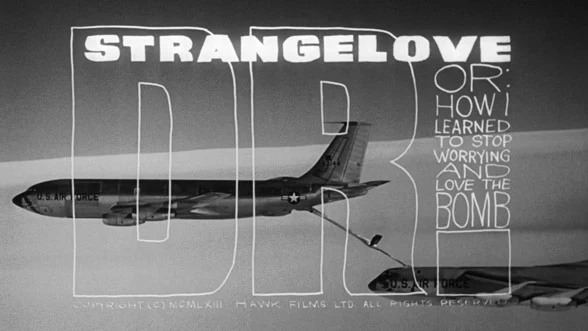

Laughing In The Face Of Danger…
Cinephile Paradiso opened their second season with Stanley Kubrick’s scathing political satire, Dr. Strangelove. The film follows various world leaders as they attempt to deal with the fallout of a military official releasing nuclear warheads on the Soviet Union. Released in 1964, this was a (obviously) very controversial topic for a film to cover. So much so that the film contained a note that the film was not based on anyone and that safeguards were in place to prevent any event depicted from hereon, so as not to cause further tensions during the Cold War period in which the film was released.
In my opinion, this film is a bit of a departure for Kubrick, who is primarily known for quite dark fare. Not to say that the subject matter of this film is not dark, it very much is and was even more so at the time, a period where some of the contents were not out of the realm of possibility. The action that sets the sequence of events of the film in motion is when American Air Force captain, Jack Ripper (you read that right), orders his nuclear bomber fleet to attack the USSR. Ripper has quite obviously lost his mind as he’s obsessed with the idea that the people of the Soviet Union are after the precious “bodily fluids” of the American people. From here, we see the panic from both sides as representatives of the USSR scramble alongside the American president and his advisors to call off this military strike. While the film is often laugh out loud funny, not something to expect from the visionary behind The Shining and Full Metal Jacket, it takes a more serious note when one takes pause to consider how likely something like this is to happen. What if the codes for the nuclear bombs ended up in the wrong hands? Once this realisation sets in, each laugh becomes tinged with panic. Especially when you consider who had access to the nuclear codes for the better part of the last 5 years.
Based on the novel Red Alert by Peter George, Kubrick, quite rightly, takes a more light-hearted approach to the topic as a straightforward adaptation may have been one of the bleakest things ever committed to celluloid. Kubrick’s script, which he co-wrote with Terry Southern and the novel’s writer, Peter George is whip-smart and side-splittingly funny and provides great showcases and monologues for many of the film’s fantastic cast members. The two standouts of the film are Peter Sellers (in multiple roles) and George C. Scott, each of these actors are fully game to roll with the ludicrous nature of what’s being discussed and it’s this commitment that allows the film to be even funnier. They’re not playing their roles for gags; they’re playing this as if it were Shakespeare. Tensions and laughs mount as the politicians must deal with one fiasco or personal quarrel after another. While the film is particularly relevant today, it would still work whether it was due to the superb performances and hilarious script.
The film is essentially about laughing in the face of danger, shown through Kubrick’s constant juxtaposition of the nuclear situation with the absurd actions of the people in charge. The quarrels between the military personnel and world leaders become more and more unhinged as the film goes, resulting in some absolute zingers. Peter Sellers showcases his talents in three very different roles, the U.S. president, the RAF captain, and the titular Doctor Strangelove. It’s in this role he delivers a barnstorming monologue that has become nothing short of iconic. Each of these roles are comedic in their own way, some a lot more so than others, but show three very different personalities that Sellers fully commits to. Kubrick’s choice to go the route of a black comedy for this subject matter is an inspired one as he takes something universal to approach and bring the issues of the current times to a larger audience than perhaps a bleak drama could have reached. There was enough misery at the time with the tensions and paranoia of the Cold War, why not make them laugh? Kubrick is positing the paranoias on both ends are somewhat absurd. We can see this through the American generals’ bizarre idea that the Soviet Union has altered his sex drive and this results in his obsession with wiping them out.
What if the codes to end the world as we know it were in the hands of a lunatic? Sounds familiar, huh? Kubrick’s political satire was simultaneously of its time and lightyears ahead of its time. With a hilarious script that moves at a breakneck pace and a tremendously game cast, this is a shining example of a political satire. The result is one of the most daring comedies ever released, still as relevant and funny as ever. Kubrick really was the master of every genre.

